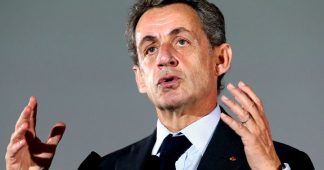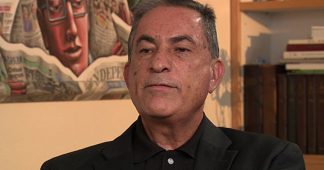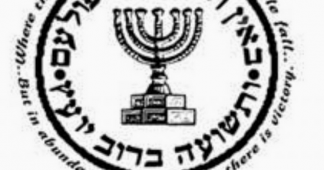Bernard-Henri Levy blunders on Israeli-Libyan ‘mission’
Leela JACINTO
10/06/2011
Bernard-Henri Levy is known to weigh in on weighty international issues. But when the controversial French philosopher-writer took it upon himself to mediate a détente between Libya and Israel, he apparently went too far.
Bernard-Henri Levy, France’s arguably most flamboyant, unbuttoned, unplugged public intellectual seems to have talked his way into a controversy – again.
The French philosopher-writer commonly known as BHL is no stranger to the faux pas – one particularly embarrassing gaffe involved him citing a blatantly fake philosopher.
This time though, the flap revolves around the delicate business of Arab-Israeli relations. But curiously for a man whose exploits are frequently – some would say too frequently – under the spotlight, the latest controversy appears to have slipped under domestic and international radars.
The first salvo in the latest controversy was fired earlier this month in Jerusalem, where Levy had a 90-minute meeting with Israeli Prime Minister Benjamin Netanyahu.
During the meeting, Levy relayed a verbal message from Libya’s opposition leaders that the National Transitional Council (NTC) would seek diplomatic ties between Libya and Israel if it came to power. At least that’s what BHL said he said.
In an interview with the AFP, Levy said he told Netanyahu that, “the future [Libyan] regime will maintain normal relations with other democratic countries, including Israel,” before going on to add that, “the main point was that the future Libyan regime would be moderate and anti-terrorist and will be concerned with justice for the Palestinians and security for Israel.”
While Netanyahu’s office confirmed the meeting with the French writer-philosopher, it declined to comment on the content of the discussion.
But just days after the meeting, the NTC released a miffed statement – a copy of which was obtained by FRANCE 24 – declaring that it “strongly rejects what has been reported in some media as Mr. Bernard Levy’s comments on the future relationship between Libya and the Israelis.
“The NTC is surprised by Mr. Levy’s comments,” the statement went on to add. “Mr Levy was received as a Special Envoy from the President of France, and relations with Israel was never discussed.” (sic)
A self-styled “militant philosopher,” BHL has no official position in the French cabinet or government.
Enter the ‘militant philosopher’ saving the Libyan people
A swashbuckling public intellectual who has expounded on a host of international issues ranging from Afghanistan and Bosnia to Iraq and Pakistan, Levy played a well-documented role in making France the first country to recognise the NTC as the sole representative of the Libyan people in early March.
It was Levy who put Libyan opposition representatives in touch with French President Nicolas Sarkozy following a trip to the eastern Libyan city of Benghazi days after it fell from Muammar Gaddafi’s control
Levy has since repeatedly returned to rebel-held areas of Libya – including the battle-scarred city of Misrata – and has acquired quasi superstar status in Benghazi-based Libyan opposition circles.
Given Levy’s role in helping secure the critical March 10 official French recognition, many NTC officials believe the French intellectual has a special relationship with the French president that allows him to bypass routine diplomatic protocols and command.
“The NTC has long believed Levy is an official French envoy,” said Barak Barfi, a research fellow with the Washington DC-based New America Foundation in an emailed response to FRANCE 24 from Benghazi.
“Even in its press release denying the existence of a message [to Israel], it called him ‘a special envoy from the president of France,’” noted Barfi. “Everyone here knows Levy. They think he is an important figure fuelling France’s stance on Libya.”
Forty-two years of anti-Israeli rhetoric
As the Arab Spring blows hot and cold, much column space has been spent speculating about the impact of the uprisings on Arab-Israeli relations.
In Egypt – the world’s largest Arab nation and one of the few Arab League members to have diplomatic relations with Israel – there is a widespread belief that a democratically elected post-Mubarak government would be less willing to cooperate with Israel.
In Libya, under 42 years of Gaddafi, the anti-Israeli rhetoric – at least in the public domain – was strident.
Libya has never recognised Israel and Gaddafi frequently calls for Israel’s destruction. Since he seized power in 1969, Gaddafi has supported the most radical Palestinian factions, railed against Arab states that have relations with Israel, and systematically refers to the Jewish state as “the Zionist enemy”.
Gaddafi may have been ousted across swathes of Libya. But after more than four decades of his reign – many of them spent in international isolation exposed to an unrelenting state propaganda machinery – Gaddafi’s legacy lives on in some quarters of liberated Libya.
International reporters and analysts visiting opposition-held Benghazi are sometimes disconcerted to discover that many Libyans have trouble differentiating between Israelis and Jews.
Graffiti in parts of Benghazi display a Star of David next to Gaddafi’s name with Arabic text calling the reviled Libyan leader a Jew and a Mossad agent. “They are comparing their worst enemies to each other,” explained Barfi.
“In relation to other Arab countries, I would rate Libya in the most anti-Israeli camp along with Syria and Yemen. Though Libyans are less prone to see Israel’s hand behind every conspiracy as Syrians and Yemenis do, they harbour deep anti-Israeli sentiments.”
Given this context, Levy’s assurances to Netanyahu about the NTC’s alleged intention to seek diplomatic ties with Israel raised eyebrows in some Mideast analyst circles.
Barfi, like many seasoned observers, is willing to give the NTC the benefit of the doubt on this one. “It is very doubtful the NTC would reach out to Israel,” said Barfi. “It is possible Levy misunderstood what was said to him and was given a vague assurance that the NTC wants good relations with all the countries in the region.”
Despite repeated attempts to contact him for a response, Levy failed to reply to FRANCE 24.
‘An ineffective debating society of second rate players’
Born in Algeria into a wealthy Sephardic Jewish family that moved to Paris shortly after his birth, Levy is a self-confessed “defender” of Israel – but not uncritically so.
Some of his worst lambasts (such as his book “Left in Dark Times”) are reserved for Leftist – especially Jewish leftist – critics of Israeli policies such as the 2006 Israeli invasion and the international reaction to last year’s Gaza flotilla raid.
But Levy has also been critical of Israeli right wing policies, calling for the freezing of Israeli settlements in the West Bank and East Jerusalem. He also recognises the need for a Palestinian state.
But in a country fed on 40-odd years of anti-Israeli propaganda, the nuances of the Arab-Israeli issue are often lost on the Libyan street. Few residents of Benghazi are aware – or for that matter, particularly care – about Levy’s Jewish roots.
As for the NTC, little is known about the inner workings of Libya’s transitional authority. While the council is made up of 33 members, many of them have not been named due to security concerns.
Some analysts have warned that a climate of instability risks eroding support for the NTC, which is largely disorganized and has been unable to articulate a political program beyond calling for Gaddafi’s ouster.
But while Barfi concedes that the NTC may look like “an ineffective debating society of second rate players” to an outsider, he maintains that such an analysis overlooks Libyan customs and what ordinary Libyans seek from the council.
“Libyans are looking for a gradual transition away from an authoritative regime that opted for whimsical policies rather than slowly building government institutions,” said Barfi.
He dismisses the notion that there might be differing opinions on Israel within the NTC. “I do not believe that this is a case of a mix-up with the NTC,” he maintained. “Under no circumstances would it reach out to Israel.”
While the NTC was quick to reject Levy’s controversial proclamations on future Israeli-Libyan relations, Barfi believes Libya’s new “bland technocrats” might be willing to overlook the latest little spat in the larger interests of the nation.
“Levy will continue to have high level access to NTC members and be viewed as a key conduit for messages between the council and the French president’s office,” said Barfi.
Just as long as the French militant philosopher does not take it upon himself to serve as a conduit to the Israeli premier’s office, that is











